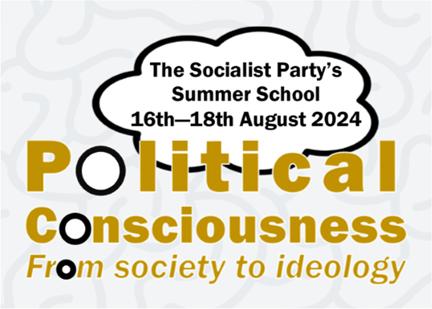Easter was once the time for putting on your duffle coat, making sure you were wearing the appropriate badges, picking up your banner and going on the march to Aldermaston to protest against nuclear weapons. Fast forward to 2024 and marches of various kinds are still happening to protest against the various iniquities the capitalism imposes upon us all across the world.
Well meaning intentions butter no parsnips as they say.
A suggestion, a worthwhile activity to engage in at Easter or any other time of the year would be to educate yourself about the benefits of real Socialism and how to bring it about. Workers of the World Unite! You have nothing to lose but your chains!
Editorial from the Socialist Standard, March 2008
‘Fifty
years ago this Easter CND (Campaign for Nuclear Disarmament) was
effectively born from demonstrations held outside the Atomic Weapons
Research Establishment at Aldermaston, Twenty-five years on from
Easter 1958, the Campaign for Nuclear Disarmament (and similar
movements) had risen again, able to mobilise millions onto the
streets of capital cities throughout Western Europe in response to a
return to cold war US/USSR rhetoric.
During the 50 years
of CND's history some things have changed: Trident has replaced
Polaris and Faslane submarine base has replaced Greenham Common
cruise missile base as the focus for protest. Meanwhile the global
nuclear stockpile is now double what it was in 1958, and the number
of nuclear states has also more than doubled.
And it
wasn't just the badges with the distinctive CND logo that were
recycled from the 60s to the 80s: the same kilogrammes of uranium or
plutonium from scrapped and ageing warheads have been thoughtfully
reused ten years later in the next generation of killing
technology.
Despite the laudable aims then – as embodied
in their title – the reality of CND is that it has been a front: a
cover for the little-known CPPTSRNP (Campaign for Possible Partial,
Temporary and Reversible Slowing of the Rate of Nuclear
Proliferation). A bit more accurate, if a little clumsy when put on a
banner, and hardly a good rallying cry for supporters of course. But
CND has, by whatever measure you wish to use, failed. Not through
lack of effort of course – no other issue dominated politics
throughout the 60s, 70s and 80s.
The parties of the World
Socialist Movement are unique in opposing all war – not just
certain types of war or certain situations. This is based on a
recognition that the interests of the working women and men who
usually make up the cannon-fodder and collateral damage of war can
never be aligned with states and governments. We oppose the monopoly
that the global owning class have over ownership of the Earth's
productive resources that are the usual spoils of armed conflict. We
see little value therefore in pleading with our rulers to continue
their capitalist battles, but to request that they use only this or
that weapon.
In the Socialist Party we were sometimes told
by CND supporters that there just wasn't enough time to work for
socialism: there were only weeks or months left to stop nuclear
annihilation and that objective had to be the priority. Thankfully
that prediction proved to not be the case. But it is a common
objection to the case for socialism, that there is some immediate
more pressing campaign that – with just one final shove – will be
won, and only then can we start to look to changing the basis of
society.
The history of movements to reform one part or
another of capitalism has been a history of failure in the main part.
We can choose to tinker at the margins or to get to grips with the
problem. We can complain about the symptoms, plead with our rulers,
or make the decision to address the cause. The history of CND should
give us no confidence that reformism is fit for purpose – certainly
not with regard to trying to do away with weapons.
We
predict that unless the war machine that is capitalism is politically
challenged by a majority – armed with nothing more or less than an
understanding of how it works – then in another 50 years we will
still have wars raging round the globe, with ever more sophisticated
weaponry. And of course, we will still have CND. The choice is
between a world to win and a world to lose.’

 University of Worcester, St John’s Campus, Henwick Grove, St John’s, Worcester, WR2 6AJ
University of Worcester, St John’s Campus, Henwick Grove, St John’s, Worcester, WR2 6AJ